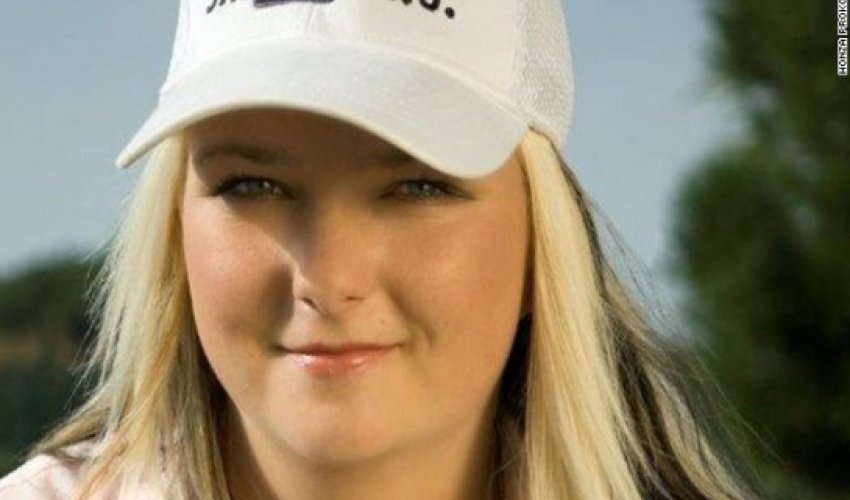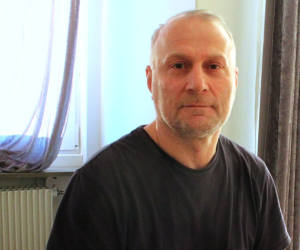Teen queen of crazy golf

It's the putt all golfers want to be stood over. The final hole of a Masters weekend, find the cup and the coveted green jacket is yours.Your heart is racing, your palms sweaty, can you maintain your focus?The contender surveys the scene, taking in the erupting volcano and giant wooden heads which line the Hawaiian Rumble course before delicately guiding her shot off a brick and into the hole.No, not the Augusta National Country Club, but a minigolf course in Myrtle Beach.Not Tiger Woods, but 18-year-old Olivia Prokopova, one of the world's leading minigolf players and a double Masters champion."I started playing as a three-year-old kid," the Czech told CNN."My dad worked as a sports reporter and he took me with him to an interview he did with a minigolf trainer. I tried to play there and really liked it. Apparently, I kept asking when we would go back to play more."Since then, I played regularly, and started going to tournaments."Minigolf, commonly referred to as crazy golf, originated in 1867 at the Royal and Ancient Golf Club in St. Andrews, Scotland.With women at the time keen to play the conventional game, and the violent swinging action required to hit a drive deemed most unladylike, an 18-hole course of putting greens was built.The rest, as they say, is history and 150 years later people from all over the world enjoy minigolf in a wide variety of locations on courses littered with tiny waterfalls and animatronic dinosaurs.It might not be as famous or well-known as the full-size game -- "big golf," as Prokopova says -- but away from the fairways and bunkers of conventional courses is a hardcore community of players dedicated to golf's miniature cousin.And none are more dedicated than Bob Detwiler, the founder of the U.S. Pro Minigolf Federation.Detwiler opened the Hawaiian Rumble course in 1992 and decided to start holding tournaments. The first was the Masters in 1997, followed one year later by the U.S. Open.While the former is always held at Detwiler's course, the latter annually switches location, mirroring the long-established traditions of golf's equivalent tournaments.And the similarities have not been lost on those at Augusta National Golf Club, home since 1934 of what is now the season's opening major tournament."I've been called three of four times by the people at Augusta," explained Detwiler. "They said I was infringing on their name and stuff."I said, 'How can that be? There's the Masters of tennis, of marbles. You name it, there's a Masters of it.'"They asked me to do certain things, but they've never said I need to cease and desist."The Hawaiian Rumble course -- "our Augusta," boasts Detwiler -- annually attracts players from across the globe for the Masters, a tournament Prokopova has won in each of the last two years.While Adam Scott took home $1.44 million for his Green Jacket success in April, minigolf's event has a total prize fund of just $12,000."The season is expensive," admits Prokopova. "Traveling to the U.S. is expensive. We usually go there three weeks to a month before a tournament."All prize money goes back into the travels, but I still need sponsors and my parents contribute to these trips."Prokopova's commitment to the sport is unquestionable. Not only does she fly 4,500 miles to compete in the U.S., she is joined by an entourage including both of her parents, her coach and, if you believe Detwiler, even a masseuse."I was seven when I first traveled to the U.S. for a tournament," said Prokopova."The atmosphere was absolutely amazing. All the other players would stand around me and cheer, some of them screaming and jumping in the air."Prokopova's fellow competitors tend to be middle-aged men who enjoy the heat of competition and the fraternity which comes with being an obscure sportsman.However Detwiler admits that some find losing to a teenage girl difficult to take."They've known her since she was seven years old, so they all like her," said Detwiler."But at the same time they want to win too. And they don't like it when some girl beats them!"But the response to Propokova is almost entirely positive, with America's minigolf courses a home away from home for the prodigy."When at a tournament, it really feels like we are one big family," said Prokopova. "We see each other regularly, at least twice a year, and we know each other. The players' community is very supportive, I don't feel much rivalry."I have once beaten the same player in sudden-death playoffs three times in row. He was a little upset and walked away briskly, but even then, he later came back and offered his congratulations."And that was the only time I could feel any sort of over-competitiveness."As minigolf continues to grow, the sport's family could welcome more and more foreign members, with players from far and wide flocking to tournaments across the globe."The World Minigolf Federation is seeing a rise in player numbers, clubs and events and greater recognition of Minigolf as a sport," its sport director Pasi Aho told CNN."There are now 46 member nations in the World Minigolf Sport Federation, with South Korea and Mongolia our most recent members."With over 1,300 tournaments played each year, including World, European and Asian Championships, there are now 38,000 registered players competing in a wide range of tournaments."For Prokopova, more major titles surely lie in wait. After all, she has won two green jackets before her 19th birthday, two more than 14-time major winner Woods had at that age.And Prokopova has set her sights on a showdown with "big golf's" biggest star."We have challenged Tiger Woods on several occasions, mainly through the media, but he never responded. Maybe he is afraid?!" she joked.Over to you, Tiger...(CNN)ANN.Az
Similar news
Similar news




































 Photo
Photo 



 Video
Video 

